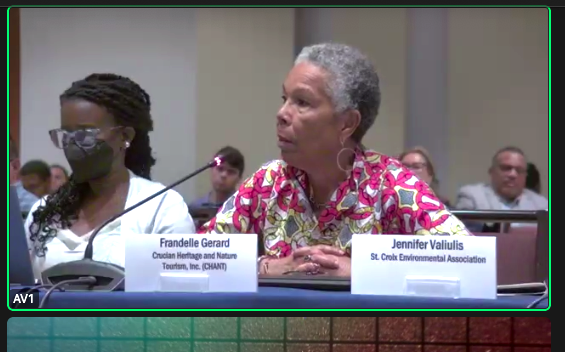St. Croix non-profit administrators told an EPA advisory council Wednesday at a meeting in San Juan, Puerto Rico, that they and other organizations in the territory need not only more funding but data to assess the extent of their needs. One executive director explained how the federal government helped turn St. Croix’s successful food-exporting economy into the “poorest Virgin Island.”
The National Environmental Justice Advisory Council, an independent federal advisory committee to the Environment Protection Agency, is hosting a three-day public meeting with in-person and virtual participants and an opportunity for public comments.
“The NEJAC provides critical, independent advice to help keep EPA accountable to ensuring that everyone gets the same degree of protection from environmental and health hazards and equal access to the decision-making process,” EPA Regional Administrator Lisa F. Garcia said.
Representatives from a number of Puerto Rican organizations spoke first on Wednesday about their environmental justice issues. Then the directors of the St. Croix Foundation for Community Development, Deanna James – the St. Croix Environmental Association, Jennifer Valiulis – of Crucian Heritage and Nature Tourism, Inc, and Frandelle Gerard were invited to speak about challenges they face.

James explained that the SCFCD, as the fiduciary for a smaller non-profit organization that does not hold 501c3 status, has to share scarce community resources.
Valiulis said her organization, which monitors refinery accidents, needs data on previous discharges and accidents. She also said “the little guys” need help getting through and around the bureaucracy of the federal government when applying for funding.

CHANT director Frandelle Gerard said the organization is willing to be a public voice and tries to demonstrate advocacy for the community.
All three administrators requested access to unrestricted funds because it is difficult to work through the federal government with small or all-volunteer staff. James also requested a national advocator to help with grants.
In response to a question, Gerard gave the audience a Virgin Islands history lesson. Before 1964, St. Croix, with a population of 10,000, exported cattle, milk, eggs and produce. That year, the federal government sold prime agricultural land on the island’s South Shore for an alumina plant. The owner drove tractors and trucks into the sea and dismantled farm housing. The mangrove was destroyed and St. Croix became “a sacrificial island for the economy,” Gerard said.
During a question and answer period after the presentations, a member of the Advisory Council recognized and agreed that the Virgin Islands needs more access to unrestricted and “unburdened” funds. Another suggested funding for CHANT and SEA for education.
“It’s a great opportunity to attempt to put funding directly where people are asking,” April Baptiste, one of the NEJAC presenters, said.
After the Puerto Rico and Virgin Islands representatives spoke and answered questions, NEJAC talked about new funding sources available as a result of the Inflation Reduction Act.

The Environmental Climate Justice Program has been allocated $3 billion for grants and technical assistance for disadvantaged communities. The applicant must be a community-based non-profit organization alone or in partnership with a government or college/university.
Grants will be considered for climate adaptation and resiliency, indoor air pollution or mitigating climate and heat-related health issues, pollution remediation and prevention, workforce development tied to pollution and greenhouse gas reduction. The grants can also include technical assistance.
For almost four hours afterward, community members and NEJAC members called in about environmental issues around the country, including the lack of clean drinking water.


